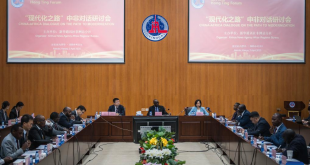
By Hanane Thamik
China has dramatically increased its presence in North Africa in terms of trade and investment over the past two decades. Pragmatism is perhaps the best word to describe Chinese-Moroccan relations. Because both parties are aware of the importance of the other and therefore try to use these beneficial aspects. Although China knows that Morocco is a state close to the West, it continues its intention to establish good relations with Morocco due to its geostrategic position. Morocco’s links with the Gulf countries, its membership of the African Union, its diplomatic proximity to sub-Saharan Africa are welcomed by China, but this also increases the attractiveness of Morocco.
Chinese-Moroccan relations have generally been and continue to be stable and there have been numerous high-level official visits between the two countries. Issues such as non-interference in each other’s internal affairs, win-win situations, common development, stability, and cooperation between the two were also reflected in the attitudes of both. In addition, China supports Morocco’s political stability. For example, China made statements in favor of the Moroccan administration during the 2011 uprising.
Morocco was the first state in the region to sign a memorandum of understanding with China under the belt and road project. This had a positive effect on the Moroccan economy, as many Chinese companies started to come to Morocco. In addition, the number of Chinese companies is increasing day by day as Morocco acts as a bridge due to its geographical location.
His Majesty King Mohammed VI sought to reconstruct the country’s foreign policy, so the King began to seek new trade from the East, even though it was connected to the West. As a result, Morocco started to receive investments from China and Chinese investments increased significantly between 2011-2015. With China’s investment in the Noor solar power plant project in 2014, total investment increased by 195% in 4 years. In 2016, King Mohammed VI and President Xi Jinping announced a strategic partnership between the two countries and signed numerous agreements in various economic sectors. After 2016, the volume of trade between the two countries reached 5.3 billion dollars in 2018 against 4 billion dollars. However, most of this trade volume is made up of exports from China to Morocco. While China’s share in Morocco’s total imports was 10.4% in 2019.
Among the agreements announced in 2016 was an agreement with a Chinese developer, Haite, for the construction of the Mohammed VI Tangier Tech City, a $ 10 billion, 7.7 square mile industrial and technological site intended to house 300,000 people and create 100,000 jobs. This is a fairly ambitious project aimed at capitalizing on Tangier’s proximity to Europe, and the infrastructure projects planned to support it (the modern port of Tangier Med, a motorway network, a train line high speed, and industrial and logistics areas). The development was to be divided into areas specializing in aerospace, automotive, telecoms, and a host of other sectors. The objective was to attract around 200 multinational companies as well as around 100 Chinese companies wishing to access European markets. Funding for the city’s construction would be available over 10 years, with funds coming from Haiti and the Bank of Africa, as well as from the Moroccan government.
A new step was taken in the ambitious project of the Mohammed VI Tangier Tech City in 2020, with the holding of a virtual ceremony to sign partnership agreements with China Communications Construction Company (CCCC) / China Road and Bridge Corporation (CRBC), linking CCCC / CRBC in Beijing, the Tangier-Tetouan-Al Hoceima Region and the Tangier Mediterranean Special Agency (TMSA) in Tangier, as well as Bank of Africa in Casablanca.
Through these agreements, CCCC / CRBC formalizes its entry into the capital of the Société d’aménagement Tangier Tech SA (SATT), up to 35%, alongside Bank of Africa, the Tangier-Tetouan-Al Hoceima Region, and TMSA, thus consolidating the SATT round table.
Also, His Excellency the Moroccan Ambassador to China, Mr. Aziz Mekouar stated that the ambitious project of the Mohammed VI Tangier Tech City is intended as a model of active cooperation projects underway between Morocco and China.
Speaking on the occasion of the opening of the China –Middle East and North Africa ( Morocco ) International Trade Digital Expital 2020, the Moroccan diplomat said that Chinese companies benefit from tax incentives and advanced infrastructure they’re allowing to operate actively in this industrial zone and to have unhindered access to the largest port in the western Mediterranean, the Tangier Med.
As for the economic cooperation established between financial groups and companies of the two countries, it was further consolidated through the signing of a memorandum of understanding last October, between the Bank of Africa, through its branch in Shanghai, and the China Chamber of Commerce for Machinery and Equipment (CCCME).
A month later, the Bank of Africa again signed a memorandum of understanding with Zhejiang China Commodity City Group (CCC Group) on the occasion of the 3rd edition of the China International Import Expo (CIIE).
Focusing on the transport, energy, and real estate sectors, Chinese investments and contracts in Morocco between 2014 and 2019 totaled $ 1.26 billion. In 2016, China Railway Major Bridge Engineering Group completed the construction of a 950-meter bridge between Rabat and Salé, the longest in Africa. The $ 32.5 million King Mohammed VI Bridge demonstrates the constructive potential of Chinese-European-Moroccan cooperation.
As some Chinese companies successfully integrate, China also has the opportunity to create its industrial chain as Morocco tries to attract more carmakers to meet its 2025 target of producing one million cars per year.
The development of economic relations with China is an aspect of Morocco’s overall vision to attract foreign investment. It is part of this global vision of attracting the maximum number of partners to the country to establish strategic partnerships, diversify the economy, increase investments in the country, and trade. In addition, the Kingdom of Morocco wishes to progress within the framework of the vision it has given itself for the development and diversification of the country’s economy and to increase the volume of trade. For this reason, it is taking measures to improve economic and bilateral relations with China. Although the trade volume between the two countries has decreased slightly due to the measures taken to prevent the spread of the epidemic during the pandemic period, the trade volume will increase rapidly once the pandemic situation has passed.
Hanane Thamik is a Ph.D scholar at the School of Information Management at Wuhan University and an author of CGTN Africa. She was chosen as the Ambassador of Wuhan City to the world by Changjiang Weekly Magazine and the Moroccan Youth Representative (FOCAC 2020).
 Africa -China Review Africa -China Cooperation and Transformation
Africa -China Review Africa -China Cooperation and Transformation
